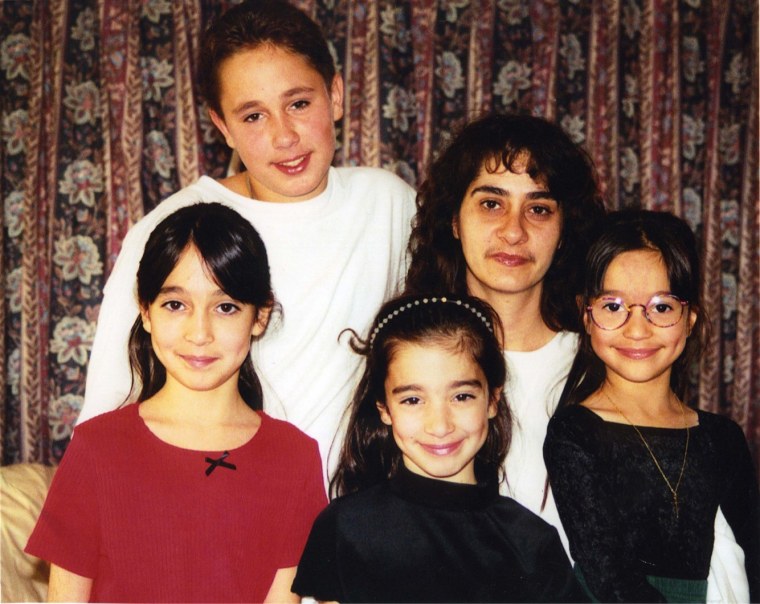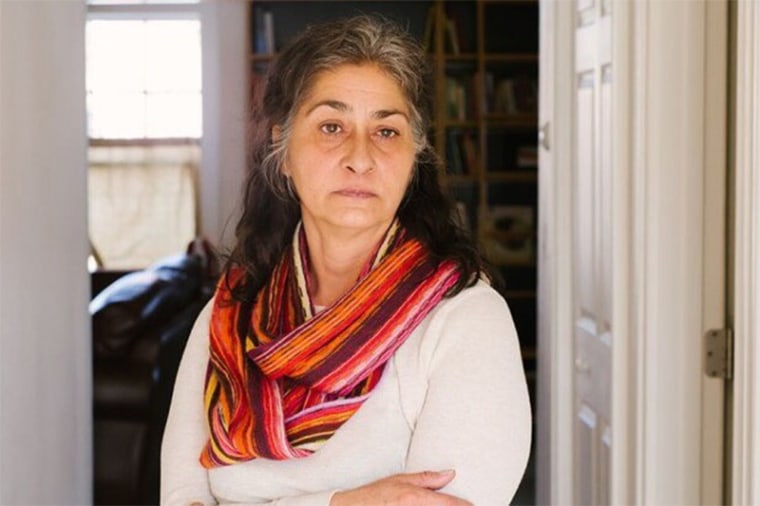Jessica Lenahan has gone through a mother's worst nightmare, and it all took place on one night in June 1999. A new documentary portrays her ordeal.
The Castle Rock, Colorado, mother of four had successfully obtained a permanent restraining order against her emotionally abusive husband, Simon Gonzales, earlier that month, requiring him to remain at least 100 yards from her and her four children, except during specified visitation time. Despite that, he took his three daughters in violation of the restraining order. Lenahan frantically called the police for hours; they told her there was nothing they could do and to let them know if the girls did not come home.
In the early morning hours, Gonzales drove to the police station and started shooting; the police shot back. They found he had killed his three daughters; the bodies of Rebecca, 10, Katheryn, 9, and Leslie, 7, were found in his van.
Filmed over the course of nine years of Lenahan's life after the tragedy, the documentary “Home Truth,” directed by Katia Maguire and April Hayes and co-produced by Latino Public Broadcasting, captures an intimate portrait of the lives of Lenahan, her surviving son, Jessie, and how the trauma from domestic violence is difficult to extinguish, no matter how much time passes.
The film documents Lenahan's relentless pursuit of justice to change the ways police and towns respond to domestic violence situations and includes interviews with members of her legal team, such as attorney Caroline Bettinger-Lopez, a former Obama adviser on violence against women.
In time for Domestic Violence Awareness Month, the film premieres Wednesday on the World Channel at 7p.m ET, as well as additional PBS stations throughout October (check local listings), and will be available for streaming on pbs.org beginning Wednesday as well.
The directors of the film heard about Lenahan's story from someone at the Human Rights Watch Film Festival in 2008. At that point, Lenahan, who is of Native American and Latino descent, had already been fighting her case for nine years and had endured a long and emotionally strenuous journey. She had filed a lawsuit against the Castle Rock police for failing to enforce her restraining order right after the incident, and in 2004, her case reached the U.S. Supreme Court.

When it was ruled, 7-2, that she had no constitutional right to the enforcement of her restraining order and that police departments could not be sued for improper enforcement of such orders, Lenahan and her legal team, including the ACLU and Columbia Law School’s Human Rights Institute, filed a case against the U.S. government with the help of the Inter-American Commission on Human Rights (IACHR).
With this case, Lenahan became the first individual domestic violence survivor to bring a case against the United States before an international board. In a 2011 landmark decision, the commission found the U.S. was responsible for human rights violations against Jessica and her three deceased children.
Maguire, an Emmy-nominated Latina filmmaker, said they first saw Lenahan speak at an event.
“What struck us the most is that she is able to talk about the horrific things that happened to her over and over again," said Maguire. "We thought, ‘How does telling her story affect her? How does she do that? We understood that the story had historic significance but being filmmakers, we wanted to look deeper into her story.”
“We really started telling the story from before the girls were killed,” Maguire told NBC News. They had footage of the girls as well, because their father had a habit of filming them — and Jessica —frequently.
Though it took nearly a decade to make the film, Maguire said they learned a lot about the judicial process and the lasting effects of domestic violence on families.
“The skeleton was Jessica’s case, but the other part was her relationship with her son, Jesse,” Maguire said. “The ripples go on far and wide. It’s a problem we have to look at from a public health perspective as well.”
Jesse was 13 when his sisters were killed, and he mentions in the documentary that when the girls died, so did the nurturing side of his mom that he loved so much. The symptoms of post-traumatic stress took a toll on their relationship — and to this day they remain emotionally and physically distant.
“Everyone is in a different place in their lives,” explained Maguire. “Different family members need to step away to take care of themselves, and we thought that was a very powerful part in the story.”
She added that she is proud of Jessica, who continues to fight for justice and against her fatigue. Although Jessica has made some strides, even winning awards from the U.S. Human Rights Network, among other groups, she told NBC News she still has lots more work to do.
Lenahan is currently a visiting scholar at the Dorothea S. Clarke Program in Feminist Jurisprudence at Cornell Law School in Ithaca, N.Y. She said it's been a 20-year battle regarding her case, but she wants an outcome that recognizes the legal rights of domestic violence victims not just in the U.S. but in other countries as well.
“I’m studying international human rights law for one semester to make sure my expertise is as sharp as it can possibly be, and I’m starting to work on my TED Talk, as I’d like to continue promoting the film and teaching people how to use their voice and make them feel like it’s within their reach," said Lenahan. "I just want to empower them.”
She's also grateful for her legal team, especially Bettinger-Lopez, currently a professor of clinical legal education and director of the Human Rights Clinic at the University of Miami School of Law. She had recently graduated from law school and was working for the ACLU Women’s Rights Project in 2004 when she represented Jessica.
Bettinger-Lopez wrote a blog post for the Council on Foreign Relations in July, stating that although the U.S. government officially rejected IACHR’s decision, it has had a crucial effect on U.S. federal policy and law enforcement.
“Following the decision, over 30 municipalities have adopted resolutions and proclamations recognizing freedom from domestic violence as a basic human right. Beginning in 2011, the U.S. Department of Justice increased its civil rights investigations into discriminatory law enforcement responses to domestic violence and sexual assault,” wrote Bettinger-Lopez. “[In 2016], the Department of Justice established a nearly $10 million grant program to implement the guidance nationwide. I have now embarked on the COURAGE in Policing Project, to implement the Guidance through a community-oriented approach.”
Maguire is proud of how Lenahan and Bettinger-Lopez continue to use this story for other advocacy work that they are doing.
“What I want people to take away from this film is that survivors’ voices are very important,” said the filmmaker. “And that survivors have a space to tell their stories, but also that we listen, and understand, that we have a lot to learn from these experiences.”
Reflecting back on the signs of abuse
“I think about that a lot. I think about what a farce it was,” said Lenahan about her ex-husband's behavior, which she described as controlling; he stalked her in her own home.
“From the very get go, he moved me, and my son, an hour away from my mom. We weren’t married yet. He systematically removed us from our security system, and from there, the control got worse and worse," said Lenahan.
She said he also took control of their money.
“I never had any money, or access to money ... didn’t have a bank card. He kept everything under lock and key,” said Lenahan, who lived like this for 10 years before taking him to court.
“We had just gotten back from the judge, and he wasn’t complying with the rules and [was] being erratic,” said Lenahan. “The girls were becoming more afraid of him. … We went back to court, and the girls didn’t want to see him anymore, but he still had the right to see them. He had just gotten a restraining order that took all his rights.”
According to statistics from the National Coalition of Domestic Violence, one in seven women have been stalked. A study of intimate partner homicides found 20 percent of victims were family members or friends of the abused partner; victims also include neighbors, persons who intervened, law enforcement responders or bystanders.
Seventy-two percent of all murder-suicides are perpetrated by intimate partners.
Attorney Bettinger-Lopez said that while there is no one pathway to safety, the National Network to End Domestic Violence and the U.S. National Domestic Violence Hotline at 1-800-799-7233 are two sources of help.
FOLLOW NBC LATINO ON FACEBOOK, TWITTER AND INSTAGRAM.

